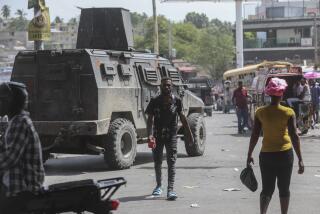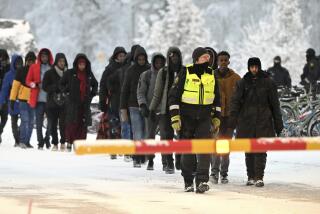Security Forces Beefed Up in Northern Ireland
- Share via
LONDON — Hundreds of additional soldiers were assigned Friday to Northern Ireland to quell the worst outburst of sectarian violence in years--seven civilians killed in 36 hours.
Part-time members of three battalions of the locally based Ulster Defense Regiment were called to full-time duty by the British army commander, Lt. Gen. Sir John Wilsey.
And the crack British Spearhead Battalion, the ready unit for immediate transfer overseas, was placed on alert in England for possible deployment in the next few days in Ulster to bolster the security forces.
The British army was still deliberating how many more troops would be needed in the first buildup of troops in Ulster since 1988. The army normally does not announce the deployment of additional troops until they are already in place in Northern Ireland.
About 10,500 regular army troops are serving as a security force in the troubled six counties of Northern Ireland to dampen sectarian killings by Protestant unionists and Catholic republicans.
Northern Ireland Secretary Peter Brooke said he was prepared to send in the Spearhead battalion at any time.
His announcement came after the outlawed Protestant Ulster Volunteer Force claimed responsibility for the ambush slaying of three men Thursday night in County Armagh. The force said that the two Catholic victims had been deliberately selected and stopped by the killers, who expressed regret at the death of a third man, a Protestant.
The organization said the killings were in retaliation for the Wednesday night shooting deaths of four Protestants, for which the outlawed Irish Republican Army claimed responsibility. In one of the attacks, a 6-week-old girl was seriously wounded.
The British military beefed up defense forces by 300 in the capital of Belfast to try to keep the peace after the shootings.
Meanwhile, Brooke said he was disappointed that the Supreme Court of the Irish Republic on Friday set free an IRA activist wanted for extradition to Northern Ireland. The five-member court ruled that Anthony Sloan, 38, of Belfast, had served a prison term in the republic and, therefore, his extradition to Ulster on a similar charge would be futile.
More controversially, the court upheld a directive earlier this year by a lower court that an arms possession charge against Sloan and a second Belfast man, Michael McKee, had political motivations--and thus barred their extradition under Irish law. On hearing of the decision, the Rev. Ian Paisley, an Ulster Protestant leader, called the Dublin Supreme Court’s reasoning “Irish blarney.”
More to Read
Sign up for Essential California
The most important California stories and recommendations in your inbox every morning.
You may occasionally receive promotional content from the Los Angeles Times.









